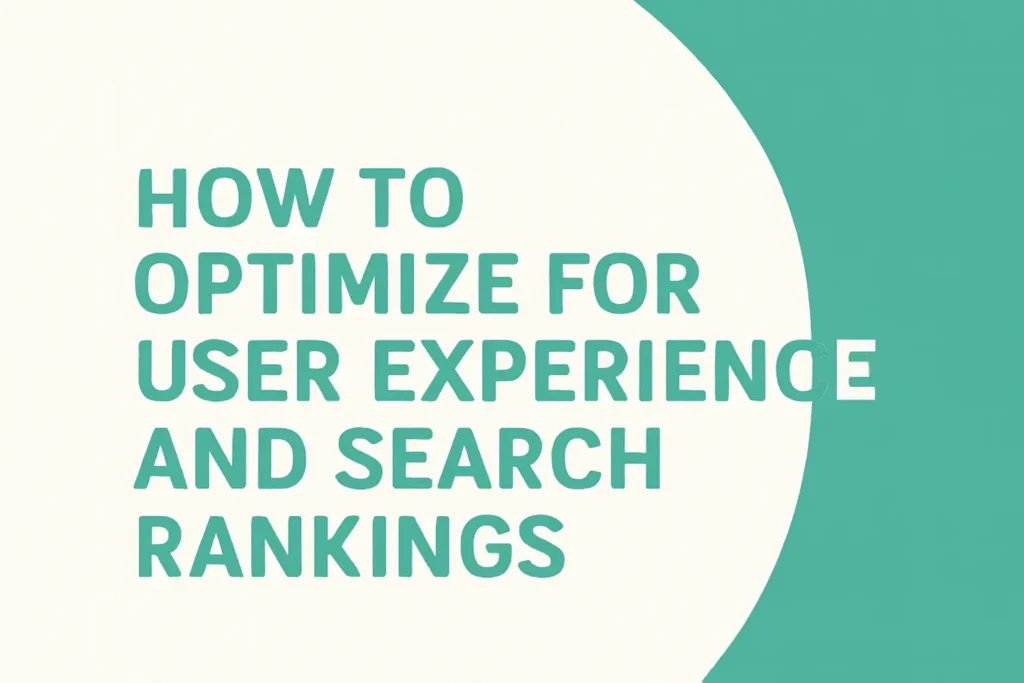In today’s digital landscape, achieving high visibility in search is crucial for success. Optimizing for search engines is no longer just about keywords and backlinks; it’s also about creating a seamless and enjoyable experience for your users. This article explores the crucial relationship between UX and SEO, demonstrating how a focus on user experience can dramatically improve your SEO rankings and drive organic traffic.
Understanding the Relationship Between UX and SEO
User Experience Affects SEO Rankings
User experience directly influences search engine rankings. Search engine algorithms, like Google’s, are designed to prioritize websites that provide value to users. When users have a good user experience, they are more likely to spend time on your site, explore multiple pages, and ultimately convert. A good user experience translates into higher rankings and greater visibility in search.
For many websites, issues impacting UX come from common mistakes that hurt performance, which you can explore in why your website may not be ranking and the eight SEO mistakes to avoid.
The Importance of User Engagement in SEO
User engagement is paramount for SEO performance. Search engines use user interaction metrics as indicators of a website’s quality and relevance. High user engagement, reflected in metrics like time on page, pages per session, and low bounce rate, signals to search engines that your content is valuable and meets user intent. How Search Engine Optimization Impacts User Experience
Best SEO Practices for Optimizing Content
Strategies to Improve SEO Through User-Centric Design
To improve your SEO, adopt user-centric design principles that prioritize a seamless and intuitive user experience. Begin by conducting thorough user research to understand user intent and preferences. Use this data to inform your website’s information architecture, ensuring that navigation is straightforward and that users can easily find what they are looking for. Optimize content for search but make sure it’s easily readable.
Optimizing Content for Search and User Intent
Optimizing content for search and user intent is essential for achieving higher rankings in search engine results pages. Start by conducting in-depth target keyword research to identify the terms your audience is using to find information related to your business. Then, create high-quality, informative, and engaging content that directly addresses user intent. Ensure that your content is well-structured, easy to read, and optimized with relevant keywords.
Utilizing Keywords Effectively for Better Rankings
Effective keyword utilization is a fundamental SEO strategy for achieving better rankings and increasing visibility in search. Start by identifying target keywords relevant to your business and industry using SEO tools. A balance of targeted keywords and user-friendly content will help search engines better understand your website’s relevance and improve your SEO.
Metrics to Track for SEO Performance
Key Metrics to Measure User Engagement
When striving to improve your SEO, it’s crucial to monitor key metrics related to user engagement. These metrics provide insights into how visitors interact with your website, helping you refine your strategies for better search engine ranking. Time on page, for instance, indicates how long users spend consuming your content, with longer times suggesting higher engagement. Consistently tracking and analyzing these metrics allows you to optimize user experience and ultimately improve SEO performance, leading to better search engine results.
Analyzing Search Rankings and User Behavior
To effectively improve your SEO, analyzing search rankings in conjunction with user behavior provides a comprehensive understanding of your website’s performance. Regularly monitor your keyword rankings to see how your pages perform in search engine results pages. Analyzing these factors together helps search engines better understand what adjustments are needed to align with search intent and improve user engagement.
Tools for Tracking SEO and User Experience Metrics
Leveraging the right SEO tools is essential for tracking both SEO and user experience metrics, enabling data-driven optimization and improved search engine ranking. To gain insights into your website’s performance, you can use a variety of tools, including:
- Google Analytics, which is a cornerstone for monitoring user behavior, offers insights into metrics like bounce rate, time on page, and pages per session.
- Google Search Console provides valuable data on search performance, including keyword rankings, click-through rates, and crawl errors.
SEO Strategies for Mobile Optimization
The Role of Mobile UX in Search Rankings
Mobile UX plays a pivotal role in shaping search rankings, with search engine algorithms, like Google, increasingly prioritizing mobile-friendly websites. A positive user experience on mobile devices is now a significant ranking factor. When users have a good user experience on a mobile site, they are more likely to spend time browsing, engage with content, and complete conversions, leading to improved SEO performance.
Best Practices for Mobile SEO Optimization
To optimize your website for mobile devices and improve search engine ranking, you need to adopt mobile SEO best practices. These include several key elements:
- Ensuring your website is mobile-friendly using a responsive design.
- Optimizing content for search on mobile, focusing on concise and user-friendly text, along with properly sized images and videos.
- Prioritizing fast mobile page load speeds.
- Implementing structured data markup.
- Making sure your mobile navigation is intuitive and easy to use.
- Regularly monitoring your mobile search rankings and user behavior using tools like Google Analytics and Google Search Console.
By following these mobile SEO strategies, you can enhance user experience and rank higher in mobile search engine results.
Comparing Desktop and Mobile SEO Approaches
Mobile SEO emphasizes page speed optimization, responsive design, and concise content, catering to on-the-go users. Desktop SEO allows for more detailed content and complex designs, focusing on comprehensive information. While desktop optimization can rely on extensive linking, mobile SEO benefits from simplified navigation and intuitive user interfaces.
Future of SEO: AI and Its Impact on Search Rankings
How AI is Changing SEO Best Practices
Artificial Intelligence is rapidly transforming SEO best practices, ushering in a new era of intelligent search engine optimization. AI-powered algorithms are revolutionizing how search engines, like Google, understand and rank content, moving beyond simple keyword matching to comprehend user intent and context. Adapting to AI’s influence is crucial for maintaining and improving search engine ranking in the evolving search landscape. You can learn more about this shift in optimizing for AI search and dominating locally.
The Intersection of AI, UX, and SEO
The intersection of AI, UX, and SEO represents a pivotal shift in how websites are optimized for search engine ranking. AI algorithms analyze user interaction data to understand user behavior patterns. By prioritizing user satisfaction and meeting their search intent, websites can leverage the synergy between AI, UX, and SEO to achieve sustainable search engine results and increase visibility in search.
Preparing for AI-Driven Search Engine Optimization
Focus on creating high-quality, user-centric content that addresses user intent comprehensively, as AI algorithms prioritize valuable and relevant information. To achieve this, consider these key areas:
- Optimizing content for search by enhancing website structure and navigation to ensure seamless user experiences, leveraging data from Google Analytics to find more improvements.
- Prioritizing mobile optimization and page speed to meet AI’s emphasis on user experience.
Develop a deep understanding of AI algorithms to predict their impact on search engine ranking and tailor your strategies accordingly. Embrace automation tools powered by AI to streamline keyword research, content creation, and performance tracking.
Summary
In summary, the convergence of UX and SEO is paramount for achieving success in search engine ranking. Prioritizing user experience directly impacts your SEO performance, as search engine algorithms, like Google, increasingly reward websites that offer valuable and engaging experiences.
The future of SEO is intertwined with AI, emphasizing the need to adapt to AI-driven algorithms and embrace innovative strategies. By focusing on the symbiotic relationship between UX and SEO, you can enhance your website’s visibility in search, improve your SEO, and ultimately drive organic traffic. Optimize content to meet the user where they are in Phoenix, Arizona, and all surrounding cities.


